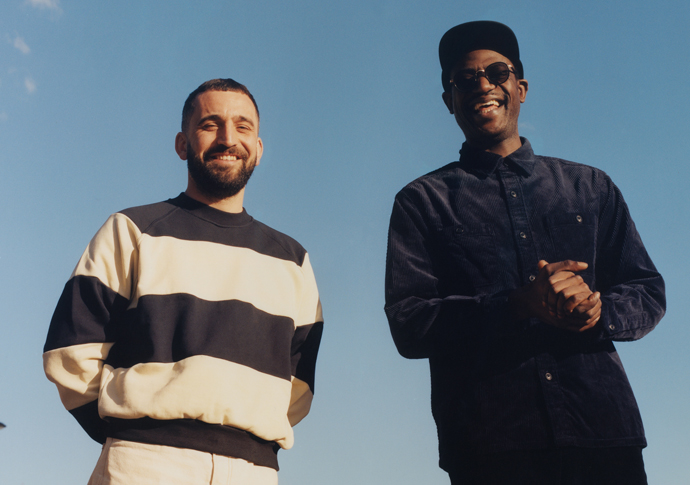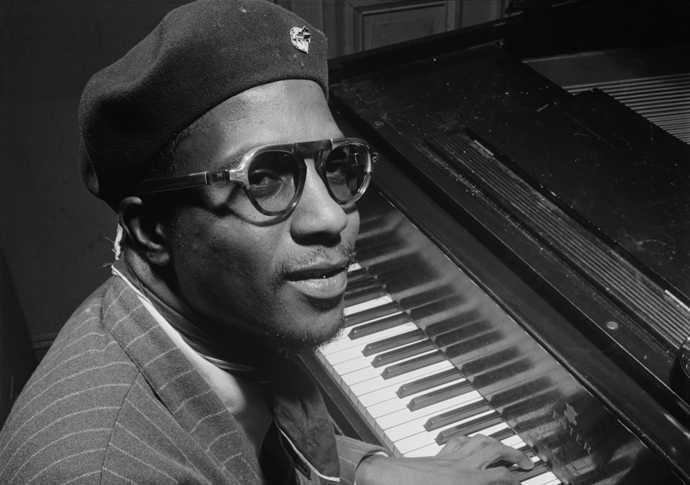In the mood for Monk
Sometimes troubled and often under-appreciated genius gave us compositions such as Round Midnight, Straight No Chaser, In Walked Bud and Misterioso
Thursday, 15th February — By Rob Ryan

Theo Erskine, left, and Mark Kavuma [Alex Kurunis]
JAZZ is full of, and to some extent fuelled by, apocryphal stories. Take the one I first heard years ago, when the clueless protagonist was meant to be sax-botherer Bill Clinton. The story was that he turned to another musician and asked: “Who exactly is The Loneliest Monk I keep hearing about?”
Clinton may not be a great saxophonist, but I think it is unlikely he hadn’t heard of Thelonious Monk (1917-1982). After all, this sometimes troubled and often under-appreciated genius gave us compositions such as Round Midnight, Straight No Chaser, In Walked Bud and Misterioso, which are key tracts in the jazz canon today.
Still, I was reminded of the Clinton tale when I looked at the track listing for a new album by groovemeister trumpeter Mark Kavuma, a stalwart of the new London jazz scene, and saxophonist (a really fine one in this case), Theo Erskine. Called UltraSound and released on Kavuma’s Banger Factory imprint, I noticed the second, slightly melancholic cut, with lovely keys work from Noah Stoneman, was called The Loneliest.
Could it be a reference to that old tale about Monk? Well, yes, obliquely – the track was written by young Jamaican-born bassist Russell Hall, whom Kavuma played with in a tribute to Monk in NYC pre-pandemic.
Hall is a great fan of the pianist. He even dresses like Monk – hipster hats, slightly out-there, vintage-style clothes, sometimes featuring loud clashing colours or patterns (much like the music Monk played).
“Monk embodies the spirit of jazz,” Russell has said. “That’s why he is still relevant. People say he was an eccentric. I say he was a transcender.”
Not everyone appreciated Monk in his lifetime. Those dissonances, angular melodies and percussive solos were fingernails on a chalkboard to some.

Thelonious Monk [William P Gottlieb]
Philip Larkin, a jazz critic as well as a poet, called him “The elephant on the keyboard.” But then Larkin hated anything that came out of bebop and Monk certainly did that, starting his career as house pianist at Minton’s Playhouse in Harlem, the crucible of the new music, where he jammed with the likes of Dizzy Gillespie and Charlie Parker. And he could be a tricky, taciturn character and he certainly had some mental health issues, but then he was part of a generation of jazz musicians who often seemed mired in personal problems. Still, those compositions remain, and musicians love to play on them, around them and in homage to them.
There are no classic Monk tunes on UltraSound, however, but the entire album is shot through with his playful, wrong-footing, sinuous spirit, being inspired in part by the posthumously released 1964 recording Live at The It Club, which sees Monk on top form in front of a boisterous crowd.
“The whole band love that album,” says Kavuma. And it’s no accident that the opening track, with its nicely skewered horn lines, is called IT. If you enjoy classic post-bop jazz played by musicians who can really get under its skin, you’ll love UltraSound, which veers from reflective and soulful to exuberant, joyful release.
The UltraSound album launch is at the Pizza Express Soho on Feb 17. The early show is sold out; book soon for the second. Tickets: www.pizzaexpresslive.com/whats-on/theo-erskine-mark-kavuma. For other Mark Kavuma gigs and to buy the album see: http://markkavuma.uk
There is another celebration of Monk out now. Saxophonist Tony Kofi, who is never far from a bandstand near you in London, released his first recording with his quartet in 2005. That CD, Plays Monk, won album of the year at the BBC Jazz Awards and is being issued as a double vinyl album for the first time by The Last Music Co. Like UltraSound it was never intended as a slavish take on Monk but uses those knotty, tricksy themes as a springboard for some fine improvisations and interplay.
There was an album launch recently at the 606 Club but you can catch Tony in many different settings around town over the next few months: https://tonykofimusic.com/events
Monk’s 1944 tune Well You Needn’t is likely to feature in the set of modern jazz classics (Shorter, Haden, Golson) by the re-formed Footprints Quartet, which plays MAP Studios on Grafton Way NW5 3DU on Feb 21 at 8pm. (http://mapstudiocafe.com/)